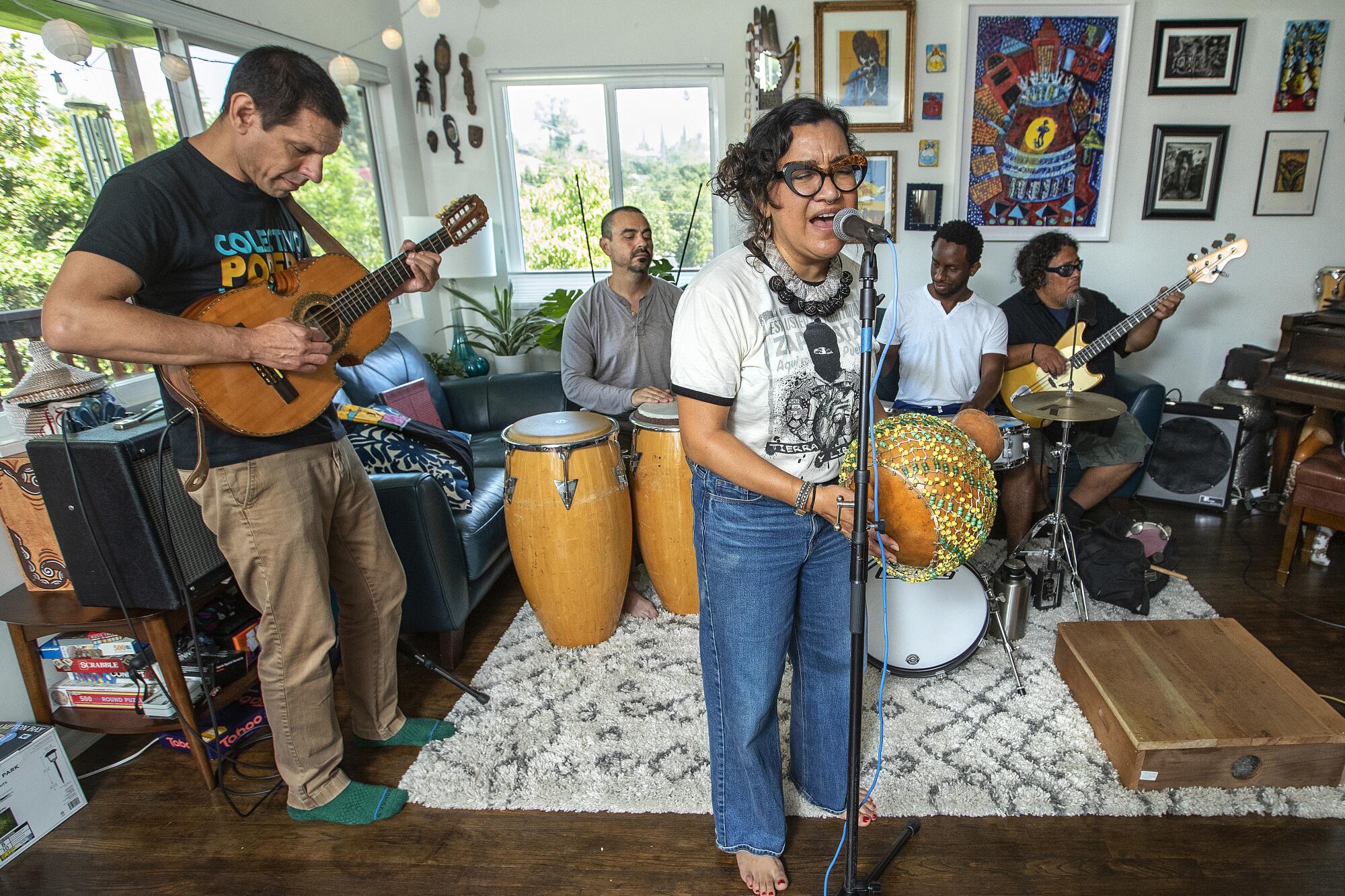
- Share via
At a parrot-green house in El Sereno, the Grammy-winning band Quetzal was tuning up for a monster jam rehearsal, a few weeks ahead of its free concert in downtown L.A. on Saturday.
The violinist had just arrived. A drum kit, piano and congas stood by in the living room.
But first the band’s founders, Quetzal Flores and Martha Gonzalez — partners in love, art and righteous activism since their 20s — wanted to talk about Kevin de León, the disgraced L.A. City Council member who represents this largely brown-skinned, blue-collar sliver of northeast L.A.
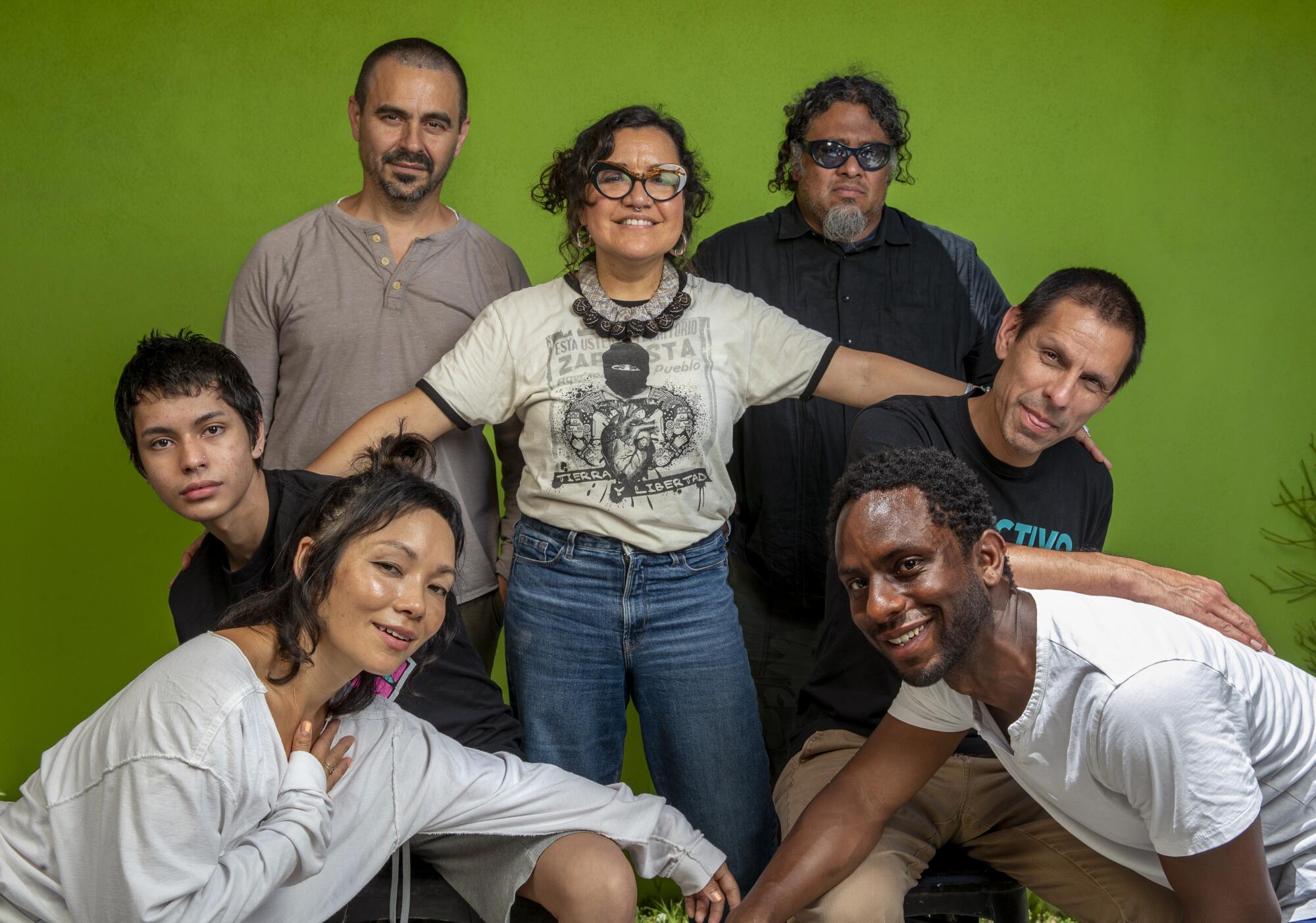
Not every band would consider the nitty-gritty of local politics to be a vital component of its mission, its identity, its reason for being. But then not every band thinks about music and art as a social movement instead of merely “an adornment,” in the words of Gonzalez, who happens to hold a PhD in gender, women and sexuality studies from the University of Washington.
For Quetzal, which formed when many young local creatives were trying to raise orchids from the ashes of the ‘92 Los Angeles uprising, culture and politics are not discrete categories of human endeavor. They are kissing cousins, comrades in arms. Just as the band seeks to unchain music from capitalist constraints, it also aspires through art to lift politics beyond formulaic slogans and worthy but over-familiar tactics.
“It’s not just about the march, it’s not just about the boycott and picket lines,” says Gonzalez, sporting a Zapatista T-shirt. Progressives need to find new ways of engaging community, she adds, “through collective songwriting or through poetry, just getting people to dialogue through creative practices that make this social justice movement even stronger.”
As the title of its Saturday gig at La Plaza de Cultura y Artes put it, this virtuoso ensemble has been redefining Chicano rock for three decades by telling “the social, cultural, political and musical stories of people in struggle.”
In the process, it has woven together a distinctly East L.A. amalgam of rock, funk and R&B with musical subgenres from across the Latin American diaspora. Foremost among them is son jarocho, an Afro-Indigenous-Euro hybrid in 6/8 time, native to the Mexican state of Veracruz. It has flourished in both rural-rootsy and urban top 40 manifestations (“La Bamba”) and migrated from Mexico to L.A., the Bay Area and beyond.
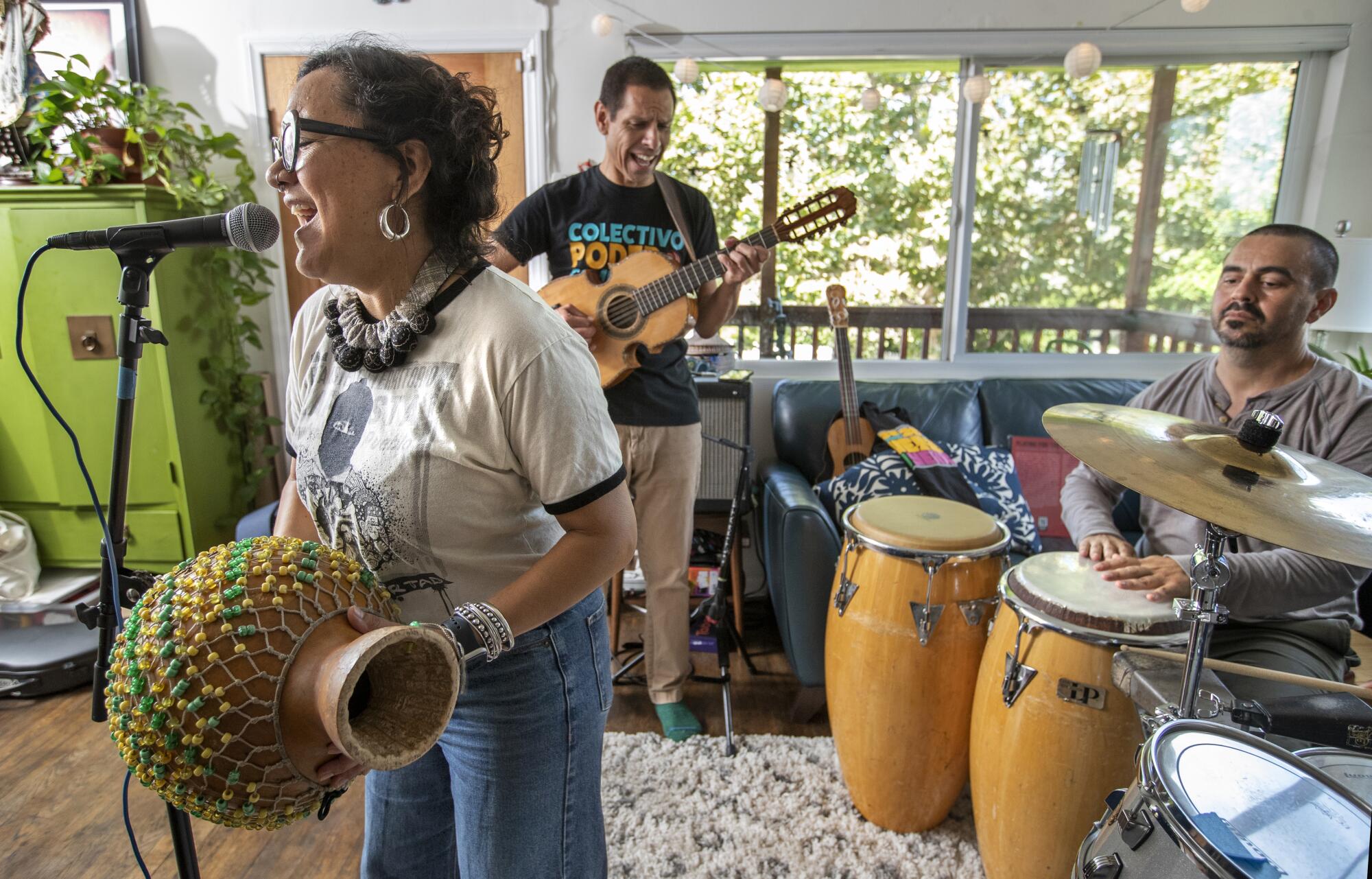
Some musicians eschew politics in favor of endless introspection. Others just talk the slactivist talk or mistake macho grandstanding for community building.
Against the odds, Quetzal has found a way to harmonize musicality with muscular advocacy. When band members aren’t playing their instruments, you’ll find them leading workshops on positive masculinity for incarcerated men. Or strategizing with neighbors to reclaim houses that CalTrans seized decades ago to build the never-finished 710 Freeway extension. Or marching on May Day for workers’ rights and immigration reform.
The band’s music captures the exuberant spirit of perpetual fighting and striving toward a better, yet-to-be-realized future — “The Eternal Getdown,” as its 2017 album styles it.
Been there, done that
So on a late July morning of this hot labor summer, before the rehearsal cranked up, Flores — the son of farmworker-organizer activists — was holding forth on rapacious corporate landlords, the erosion of working class living standards and why De León has got to go.
“This is a guy who’s done some really harmful stuff and who is not able to hold accountability, right?” Flores says in his customary mode of amiable inducement. “And he’s such a megalomaniac that he cannot understand that this is the end for him, that we don’t want him here, [that] the majority of the community does not want him here and that his presence is harmful to things we need to get done.”
What exactly, you may ask, can Quetzal do that it hasn’t already done?
Put out eight very different, risk-taking albums? Done that.
Join forces in the studio, onstage and in the street with other essential Mexican and L.A. Chicano bands like Los Lobos, Ozomatli, Mono Blanco, La Santa Cecilia and Las Cafeteras? Done that.
Maintain its creative core while constantly making space for new members and their ideas? Done that.
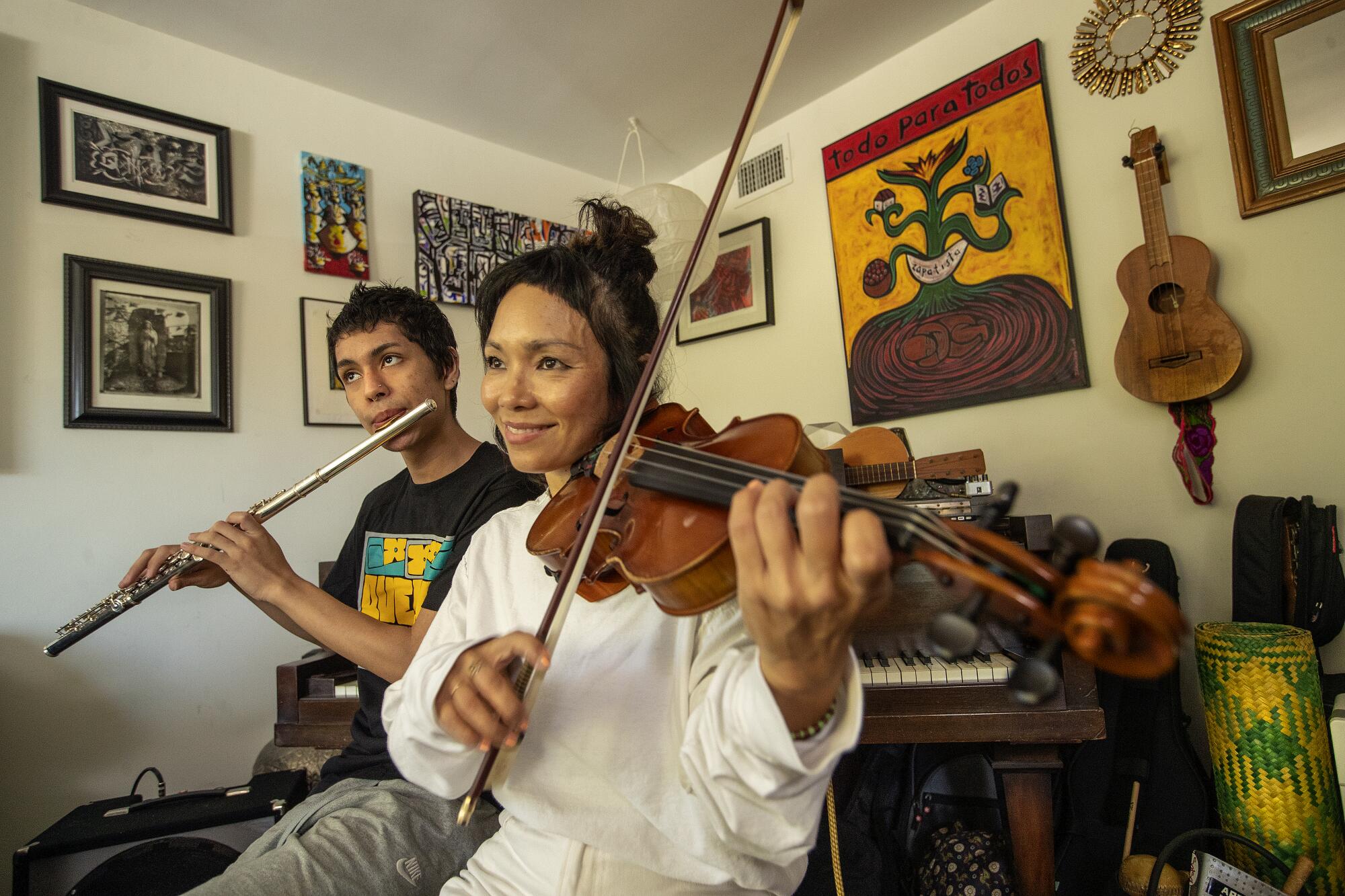
Win a Grammy? Done that too.
The 2013 trophy for Latin rock, urban or alternative album — for “Imaginaries,” the first of three LPs with Smithsonian Folkways Recordings — was a welcome gift at a time when some band members were struggling to make rent. But though it swayed perceptions of Quetzal’s music, it didn’t throw off the band’s inner compass.
“That’s part of the value system of this system, but it’s not our value system,” Flores says. However, he acknowledges, “there has been benefit. Everyone gets paid better because of it. We don’t play as much as we used to back in the day, but when we do play, everyone gets paid well.”
“I gave mine to my mom,” percussionist Alberto López says of his golden gramophone statuette. “It’s in her living room.”
In a society based on “extraction and polarization,” López adds, “the work that Quetzal does is exemplary, because it’s kind of daring to have people be human again and to speak out how they’re supposed to be, with culture, with bonds between them. Like, Grammys are cool, but the work was the same before and continues to be after in the band.”
An artistic marriage of mutual respect
With the irresistible thumping of López’s congas, the meditative coaxing of Tylana Enomoto’s violin and the rock-steady undertow of bassist Juan Perez and drummer Evan Greer, the rehearsal shifts into overdrive. In succession, the band tears through three songs — “Pesadilla,” “Luna Sol” and “Planta de los Pies.”
For “Planta,” Gonzalez slips on her red shoes and stamps out rhythms on a tarima while belting out the tune in a voice that one close friend, songwriter-guitarist Louie Perez of Los Lobos, says seems to get better with every passing year.
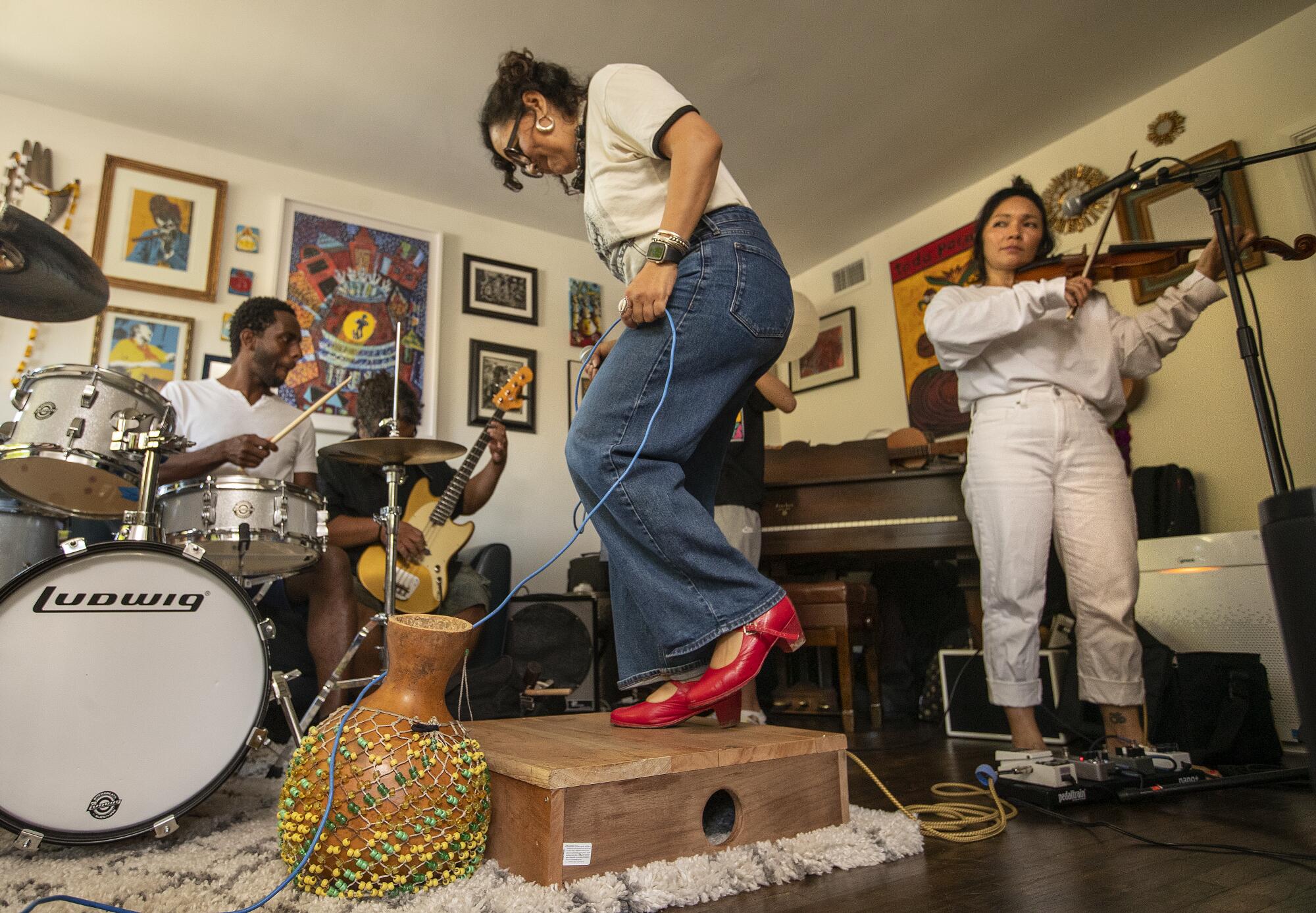
Now and again, the band pauses as the musicians praise and exhort each other. “More cowbell.” “Let’s do it for timing, and then we’ll break it down.” “I would love a violin solo right there.” “It’s G minor, not B-flat?”
Always, conversation flows between Gonzalez and Flores, whose division of labor appears to be split 50-50 in music-making, parenting, consciousness-raising. In their garden, Flores tends to the herbs and fruits; Gonzalez minds the succulents.
“There is a very clear sense of respect for each other,” says Betto Arcos, a musician, journalist, radio host and author, who accompanied Quetzal on an artistic tour of Veracruz.
“Both have very strong opinions on how music should be. So I think that if they’re working on a song, and Martha feels that this song needs this and this, Quetzal is respectful and is going to pay attention, and if he feels that she’s right, ‘Yes, let’s do that.’ But at the same time, he could also say no. They both know what they want, and they have to come some understanding and agreement so that this thing moves forward.”
And move forward it does. By infusing political awareness into songs that force you to your feet, Quetzal has managed to accomplish musically what others struggle to attain politically: an authentic Black and Brown sensibility, an East L.A. gaze that seems both organic and almost scholarly in its rigorous methodology.
Greer, the drummer, who was raised in L.A.’s Willowbrook area, says he discovered a natural affinity for son jarocho after joining the group. Among his most vivid memories is seeing the famous Cristo Negro (“blacker than me”) inside a church in the Veracruz river town of Otatitlán. The encounter inspired a track on the band’s “Puentes Sonoros” album.
“I studied jazz. I played a lot of music of the African diaspora,” Greer says, “so son jarocho, the feel of it, makes sense to me. And generally, I’m pretty good at picking up feels of music from different places. So that was musically what made it work. As far as who I am as a person, I love that they’re equally about the action behind the things they found important, and it’s not just singing about something and not doing anything.”
Quetzal’s musical peers think the same.
“They consistently stayed true to what they set out to do,” says Perez of Los Lobos. “They used music, sure, for artistic expression, but they never lost sight of their activism and the things that were absolutely necessary. I wish we were more engaged, but we jumped to that fast track of rock ’n’ roll, and I think we did do service by carrying that message near and far and, to more than a degree, demystifying what the Chicano is, what the Mexican people in general are. But they were right in the middle, and they still are to this day.”
A soulful family, home and neighborhood
Quetzal’s newest member is the couple’s only child, 18-year-old Sandino, who takes a seat at the piano. As the rehearsal spins forward, he switches to flute, then later picks up a traditional four-string guitar and starts to improvise.
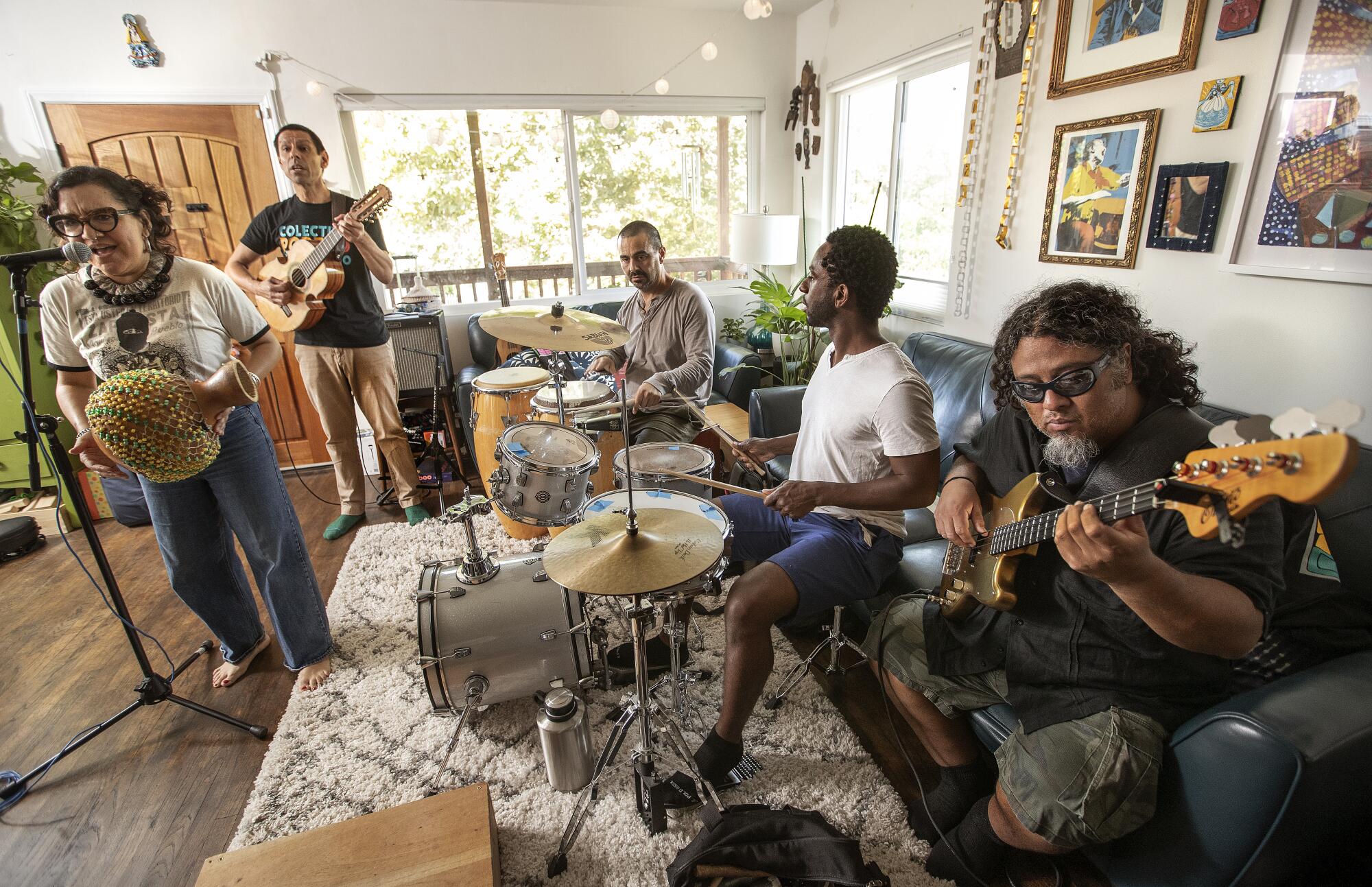
“Try some soulful meanderings,” his father encourages him. “Chicano soulful meanderings,” Sandino replies, instantly finding the groove.
This is a band that has performed at big venues, that roams sonic landscapes and seldom stays still. But its natural habitat is home. Flores and Gonzalez moved to El Sereno in 2017. For Flores, especially, it’s been a homecoming to the neighborhood where he played in a basketball league as a kid, where he went to school down the block. Martha’s sister lives in the unit in the back of the house. A rehearsal studio is under construction.
Morning glory spills over a fence. The noonday sun sweeps overhead. Flores looks around in a voice filled with gratitude and a kind of wonder.
“There’s all kinds of people still in the neighborhood,” he says, “and there’s all kinds of action happening on a political level as well that’s really amazing.”







